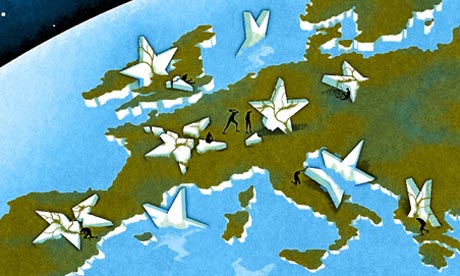What if it falls apart? For all my adult life, I have been what in England is called a pro-European or Europhile. For most of that time, European history has been going our way. Now it may be on the turn. Soon, it could be heading the Eurosceptics' way. What then? Over the last half-century, the institutional organisation of Europe has progressed from a common market of six west European states to a broader and deeper union of 500 million individual Europeans and 27 countries, from Portugal to Estonia and Finland to Greece; 17 of them share a single currency, the euro. There are no border controls between 25 European countries in the Schengen area. Enveloping it all is the fragile skin of the European convention on human rights (now under facile attack from some British Conservatives) which allows any individual resident of no less than 47 countries, including Russia, to contest a violation of their inalienable human rights all the way to a European court of human rights in Strasbourg. Never has Europe been so united as this. Never have more of its people been more free. Never before have most European countries been democracies, joined as equal members in the same economic, political and security community. Our continent still has a grotesque amount of poverty, injustice, intolerance and outright persecution. (Try living as a Roma or Sinti in eastern Europe for a taste of all that.) I prettify nothing. But – to adapt a famous remark about democracy by that great pro-European British conservative, Winston Churchill – I do say that this is the worst possible Europe, apart from all the other Europes that have been tried from time to time. Now all this is under threat. A poorly designed, over-extended and ill-disciplined monetary union is in danger of falling apart, bringing bitter recriminations and lasting divisions. More fundamentally, the past emotional motivators and political engines of European unification are no longer there. The peoples of Germany, the Netherlands and other core countries of the European Union are loth to take steps of further integration which many of the creators of monetary union thought would be necessary to sustain it. I blame politicians like Angela Merkel for not showing more leadership in this respect, but such leadership would involve a heroic, uphill struggle to persuade reluctant publics in what are still (contrary to what Eurosceptics claim) largely sovereign national democracies. If these were not sovereign national democracies, the whole financial world – from Washington to Beijing – would not this week have been waiting with bated breath on the vote of one small party in the parliament of Slovakia. I note in passing that many of the current difficulties of the eurozone were predicted back in the 1990s, and I was a sceptic about monetary union at that time. This is what I wrote in 1998: "The rationalist, functionalist, perfectionist attempt to 'make Europe' or 'complete Europe' through a hard core built around a rapid monetary union could well end up achieving the opposite of the desired effect. One can all too plausibly argue that what we are likely to witness in the next five to 10 years is the writing of another entry for [Arnold] Toynbee's index [to his A Study of History], under 'Europe, unification of, failure of attempts at'." But I am not now going to hide behind that testament to my own earlier scepticism about one element of a larger project. As a pro-European, I stand by the whole project, warts and all. I recently contributed to an appeal – which you too can sign – arguing that the eurozone can only be saved by further fiscal integration and a strategy for growth. Remarkably, even the Eurosceptic prime minister David Cameron recently told the Financial Times that Germany and France need to fire a "big bazooka" to convince financial markets and hence preserve the eurozone. That is a bit like the Duke of Wellington wishing Napoleon success in consolidating his continental empire – but extraordinary times do produce such delicious moments. Beyond this, however, I'm not going to add a single word to the 537 newspaper columns you have already read explaining how the eurozone must and can, or must not and can not, be saved. You decide which economic commentator you believe. Instead, I want to ask what happens if the eurozone does fail, one way or another – and that failure begins a much larger process of gradual disintegration. Suppose that the EU in 2030 has become something like the Holy Roman Empire in, say, 1730: still extant on paper, but more origami than political reality. What then? For us pro-Europeans, what happens then will be, first of all, a paradoxical kind of liberation. Rather like the supporters of a long-term incumbent government, for decades now we have felt some obligation to defend the existing state of affairs, with all its obvious flaws. Eurosceptics, by contrast, have enjoyed the glorious irresponsibility of opposition – and, heaven knows, the Brussels institutions furnish endless easy targets for the sceptic and the satirist. Now the boot will be on the other foot. For a few years, like an incoming government, Eurosceptics will be able to blame current problems on the preceding regime (overhasty monetary union led to German-Greek loathing, etc), but that only lasts so long. Sooner or later it will become clear that it is their kind of Europe we are living in, not mine.
Illustration by Matt Kenyon





0 comentarios:
Post a Comment